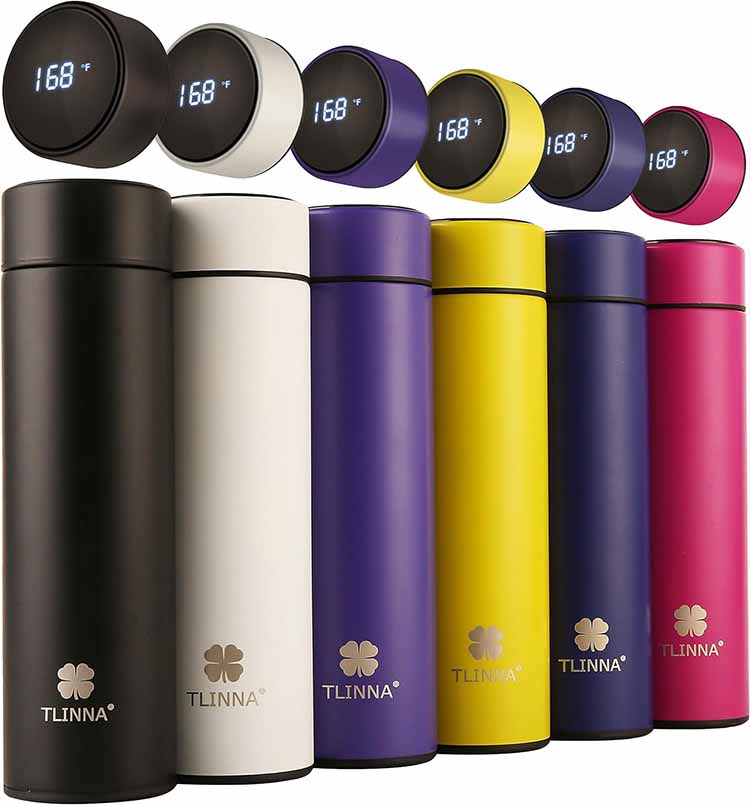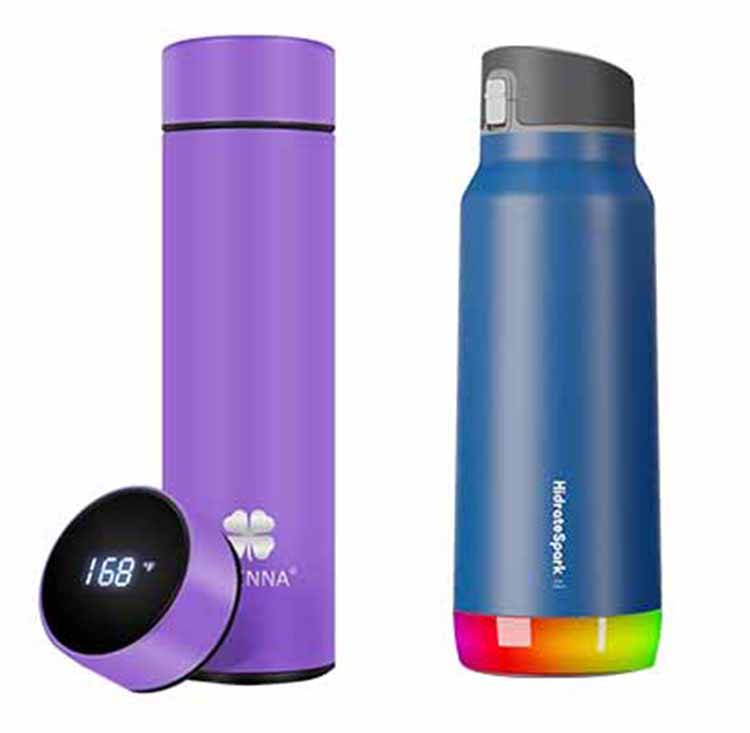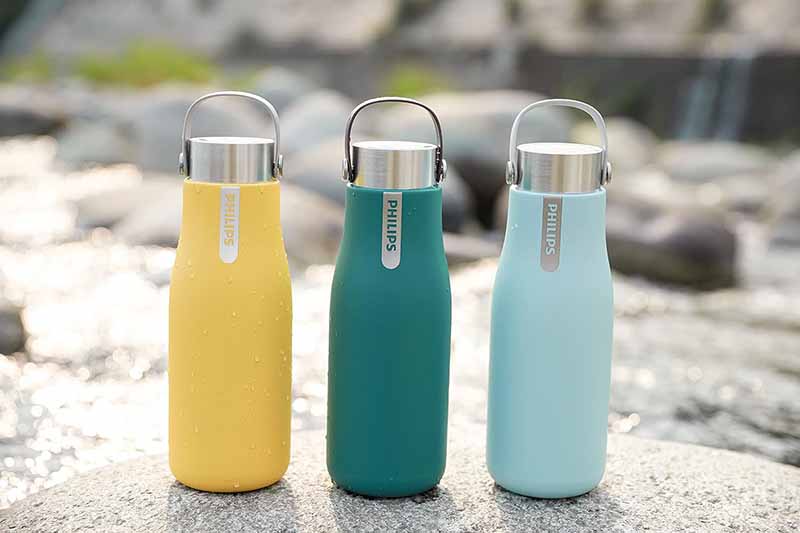Although the FDA states that our bodies quickly metabolize and expel BPA, new studies new studies suggest BPA might be more harmful than once thought. We appreciate your concern regarding the BPA topic when you’re about to buy a smart water bottle.
So, the question is, are smart water bottles BPA free?
Yes, most smart water bottles are BPA-free. They use materials like Tritan plastic, stainless steel, and glass, which do not contain BPA. These bottles are safe for daily use and help avoid the health risks associated with BPA.
Now, let’s get into the details so you can learn from different studies and research about smart water bottles and their association with BPA.
What Are Smart Water Bottles Made of?
Knowing about the materials of smart water bottles will help you find what’s in your bottle. Let’s find out the chance of having BPA in smart water bottles.
Plastic
Most smart water bottles are made from PET (polyethylene terephthalate) plastic. Food-grade PET products are BPA-free and non-toxic. Also, this plastic is designated as number 1 in the recycling triangle.
This type of plastic is clear, strong, and has excellent gas and moisture barrier properties. It’s commonly used in packaging for beverages like soft drinks, juices, and bottled water. You will also find this plastic to store foods such as peanut butter, pickles, and salad dressings.
Another incredible addition to the BPA-free plastic water bottle world is Tritan plastic. Research shows that Tritan is completely free from BPA contamination and non-toxic.
According to Utah State University, plastics that are made of HDPE (High-density polyethylene), LDPE (Low-density polyethylene), and PP (Polypropylene) are completely safe for food storage.
Stainless Steel
Is stainless steel BPA-free? Yes, it’s the safest material for water bottles, and it’s free from any harmful substances including BPA. There are a lot of smart water bottles made of stainless steel that track your hydration and offers some incredibly useful features.
A study from the University of Cincinnati confirmed that BPA-free bottles, such as those made from uncoated stainless steel, do not release BPA into stored water.
These bottles are not only safe but also extremely durable and resistant to impacts.
They do not leach chemicals into your drinks, even when exposed to heat. Also, there are double-wall and triple-wall insulated stainless steel water bottles that keep your drinks hot or cold for extended periods.
Glass
While not as common as plastic, there are some smart water bottles made from glass.
More specifically, Borosilicate glass is used in smart water bottles as it’s highly resistant to thermal shock. There’s no chance of BPA in glass materials, so these bottles are completely safe to drink from.
These bottles offer the benefit of not leaching any chemicals into your drink. Also, glass water bottles are a more sustainable option since glass is recyclable. However, they tend to be heavier and more fragile than plastic bottles.
Pros and Cons of Smart Water Bottles
We suggest you go through the pros and cons of smart water bottles before buying one.
Pros
- Tracks your water intake and sends fun reminders, making it easier to stay hydrated.
- Cuts down on plastic waste by replacing disposable bottles with a reusable option.
- Keeps you hydrated, reduces fatigue, improves digestion, and gives you healthier skin.
- Syncs with apps to remind you to drink, helping you stay focused and reducing dehydration-related issues like headaches.
- The integrated app allows setting hydration goals, tracking progress, and syncing with fitness trackers.
Cons
- High cost compared to traditional water bottles, often ranging from $50 to $200.
- They need frequent charging, which will add another device to your list of things to remember.
Things to Consider When Choosing A Smart Water Bottle
Below are some must-consider points that you shouldn’t skip before you purchase a smart water bottle.

Material
Smart water bottles come in materials like stainless steel, plastic, and glass. Stainless steel is durable and keeps drinks hot or cold longer. Choose plastic water bottles if you prefer lightweight options.
Glass smart water bottles are also a perfect BPA-free option. They don’t retain odors or flavors as well.
Note: When choosing plastic material, be extra careful about the presence of BPA in it. Try to buy our recommended types of plastic for the safest results. To avoid BPA, stay away from plastics marked with recycling symbols 3 and 7. Also, plastic products should not be exposed to high heat, which can cause chemical leaching.
Battery Life
Check the battery life of the smart water bottle. Some models need charging every few days, while others last for weeks.
Choose one that fits your lifestyle to avoid frequent charging. A longer battery life ensures your hydration tracking isn’t interrupted, making it more convenient for everyday use.
Consider the charging method as well. Some bottles use rechargeable batteries, while others require coin-cell batteries. Choose the type that best suits your preferences and lifestyle.
Device Compatibility
Another important point to consider is device compatibility. Make sure your smart water bottle is compatible with your smartphone and operating system. Some bottles only work with iOS or Android; others may need the latest OS versions. Confirm compatibility before purchasing.
App Integration
Find a smart water bottle that syncs perfectly with your favorite health and fitness apps.
You will love tracking your hydration effortlessly alongside your workouts on Fitbit or Apple Health. The app should be easy to use and offer cool features like setting hydration goals, receiving timely reminders, and monitoring your water intake with precision.
Size
The size of the smart water bottle matters a lot. Choose one that fits comfortably in your bag or cup holder so you can take it everywhere. Larger bottles hold more water, which means fewer refills are needed.
However, larger bottles can be bulkier to carry. Smaller bottles are more portable but may require more frequent refilling. Consider your daily routine and choose a size that balances convenience and capacity.
Price
Smart water bottles can be expensive, with prices ranging from $50 to $200.
Consider your budget and weigh the features against the cost. There are more expensive models that offer advanced features. At the same time, there are also affordable options with essential functions like hydration tracking and reminders. So, choose wisely.

FAQs
How Much Does a Smart Water Bottle Weigh Empty?
An empty smart water bottle typically weighs between 7 to 12 ounces. The weight depends on the material. Stainless steel bottles are heavier, while plastic ones are lighter. You can check the product specifications for the exact weight.
Can You Reuse a Smart Water Metal Bottle?
Yes, you can reuse a smart metal water bottle. These bottles are designed for multiple uses. They are durable and easy to clean. Just wash it regularly to keep it hygienic. Reusing reduces waste and plastic pollution.
Last Words
So, are smart water bottles BPA free or pose health risks?
Smart water bottles are generally BPA-free. They are made from materials like Tritan plastic, stainless steel, and glass, all of which do not contain BPA. So, you will drink from a non-toxic, safe, smart water bottle as long as you’re aware of which material is used in the bottle.
Have a safe drinking experience every time you take a sip!

